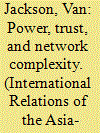| Srl | Item |
| 1 |
ID:
138098


|
|
|
|
|
| Summary/Abstract |
Why do hedging strategies appear so pervasive in Asia? This article argues that hedging – not balancing or bandwagoning – is the central tendency in Asian international relations, offering three different lenses for making sense of this phenomenon, focusing in particular on the third: power transition theory, mistrust under multipolarity, and complex networks. Each perspective highlights different factors that explain the incentives for Asian states to hedge, what hedging looks like, and how long hedging is likely to endure. Power transition theory tells us that hedging is the result of uncertainty about a possible power transition between the United States and China. Multipolarity points us to uncertainty about the intentions of a growing number of states. And the logic of complex networks explains hedging as a response to the topology of Asia’s complex network structure – consisting of sensitivity, fluidity, and heterarchy – which makes it difficult for Asian-foreign policy elites to assess the future consequences of present day commitments.
|
|
|
|
|
|
|
|
|
|
|
|
|
|
|
|
| 2 |
ID:
167670


|
|
|
|
|
| Summary/Abstract |
Scholars have been particularly hampered in their explanations and understanding of Asian security because they often learn little about Asia in their graduate training. The international relations (IR) literature draws an overwhelming proportion of its empirical source material from the European historical experience. We show that the curricula and training that graduate students of international relations receive in the United States are overwhelmingly focused on European examples. In short, the median American scholar of IR is deeply comfortable with European examples and analogies and has almost no exposure to Asian examples and history. Thus, when faced with Asian examples, they are considered within the context they are taught: through the European lens. We conclude with a call for greater attention to the empirical reality that is Asia.
|
|
|
|
|
|
|
|
|
|
|
|
|
|
|
|